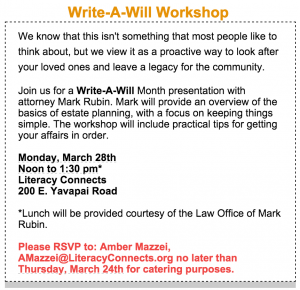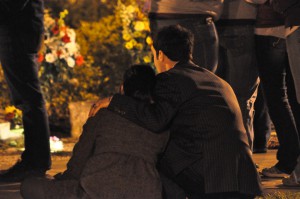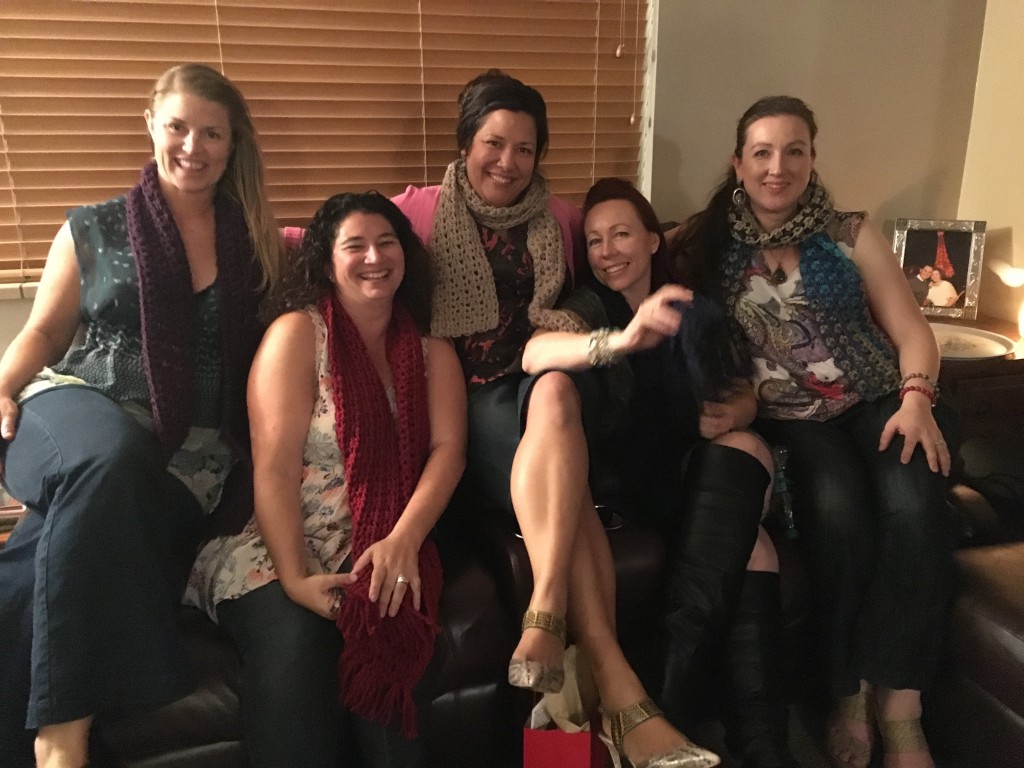March is Write-a-Will month, so although most people don’t like talking about it, now is a great time to think about planning for the inevitable.
As much as we hate to think about it, someday we’re all going to die. And for all the hard work we put into living our lives, I’d hate to think that all that would go to waste if something were to happen to me or my spouse. That’s where an estate plan comes in.
When my dad died, almost 8 years ago, my sisters and I had to figure out what to do. We walked through everything with my mom. We had an accountant and a lawyer to help answer questions, but we all still got thoroughly confused, especially since we were dealing with all this in the middle of our grief over losing our dad. But my dad was organized and had a good plan that fell into place whether we understood it or not.
These eight years later, I’m thankful that my parents had the foresight to put a plan into place. My husband and I have also been reviewing our plans and updating our wills to reflect how our wishes have evolved over the past few years. We will review every few years to make sure everything stays up-do-date, especially since circumstances sometimes change.
It’s Too Confusing! Or is it?
Having been through this process recently, I know from experience that these things can seem overwhelming and more than a little confusing, so let me simplify things a bit. Basically, estate planning involves making decisions about how you want your assets (house, bank account, personal property) to be used and distributed now and in the future, and putting those decisions down on paper.
This kind of planning also allows you to specify important things like who can make medical decisions for you if you get sick, who gets guardianship of your kids if they’re under 18, and what kind of funeral you’d like to have.
My good friend, Joe, is an amazing attorney with great skills at breaking down the confusion. I’ve referred several friends to his website to answer some basic questions, and they always feel well-informed when they’re done. Start by checking out his FAQs on estate planning here.
Attend a Workshop
A good next step is to look in your community for a FREE Write-a-Will Workshop like this one in Tucson that is sponsored by Literacy Connects (RSVP to Amber at AMazzei@LiteracyConnects.org if you are in Tucson and want to attend). Check local non-profits, the public library or even your employer to see if they offer something like this.

I went to one of these free workshops at work a while back. I learned a ton, and they presented it in a way that was fun and engaging – not at all what I expected! It was the inspiration I needed to start my estate planning.
Look for Online Resources
If you can’t find a will-writing meeting like this in your area, take a look online. The Five Wishes, from Aging With Dignity walks you through end-of-life planning in a simple yet thoughtful way. This document focuses mainly on end-of-life care and many of the medical and spiritual decisions that surround it. The beauty of Five Wishes is that it meets all legal requirements for advanced directives in 42 states and Washington, DC. In the other 8 states, it can be attached to the state’s required forms. It’s a simple workbook that can be done on paper or online, and it only costs $5. It’s also a good tool to get you started with the rest of your estate planning.
Other online tools are available to help you write your will and set up your estate plan. Just be sure to check them out to be sure they’re legitimate and have a good reputation because there are also a lot of resources on the internet that are complete scams or that are not valid in all states or countries.
Ask a Friend
Sometimes our best resources are right in front of us. While most people don’t like to talk about this stuff, it’s likely that some of your friends or family members have already been through this process and can offer assistance or a good referral.
My husband and I both got referrals to great lawyers who have handled everything for us. We have separate estate plans because we married later in life, but we’re consciously coordinating them so that they will work together. Especially since we have kids, we need to make sure our wills say basically the same thing, so our attorneys and their experience and expertise are invaluable.
Of course, the cost to use a lawyer will be higher than if you do something yourself. But if you think about it, the cost will be much higher if you don’t do it or if you do it wrong. The taxes, alone, could take a significant portion of your assets away from your loved ones, so the upfront cost of a good lawyer is well worth the expense.
We’ve also had so many questions throughout this process that I can’t imagine trying to do it myself. The nuances of writing a will so that it reflects exactly what you want is complicated, and a good attorney, with the experience and know-how to guide you, can help you feel comfortable that your wishes will be expressed clearly.
Share Your Plans with Loved Ones
Once your planning is done, be sure to share your plans with your loved ones, especially those who will have some role in carrying out your wishes once you’ve passed on. If this makes you uncomfortable, at least let them know that you have a plan and how they can access it if they need to (your attorney’s name, where in the file cabinet it is, etc.). Because NOT telling someone is almost as useless as not having a plan at all.
I know it seems like you have plenty of time to do this kind of planning, so it’s an easy thing to put off until later. But you never know what life has planned. I met my husband after his first wife was killed in a car accident. My 28-year-old niece woke up one morning, and her fiance had died in his sleep. And my friend lost her husband after a hard-fought battle with cancer, leaving her to care for their 3-year-old daughter alone.
You just never know, so do it now.
Read More















